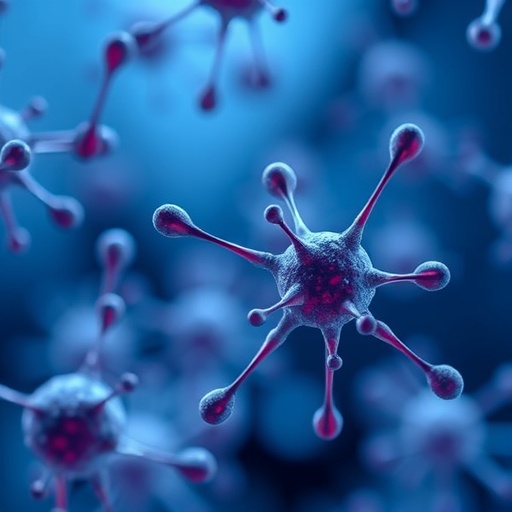Recent studies have highlighted the critical role of mesenchymal stem cells (MSCs) within the bone marrow microenvironment, particularly in the context of acute myeloid leukemia (AML). As invaluable components of the hematopoietic niche, MSCs are known for their ability to support hematopoiesis and modulate immune responses. However, a growing body of evidence suggests that these very cells may also contribute to leukemia progression, complicating their classification as purely beneficial. This paradox positions MSCs as a double-edged sword, prompting a deeper investigation into their functional dynamics within the malignant microenvironment.
The bone marrow serves as a vital reservoir for MSCs, which possess the potential to differentiate into various cell types, including adipocytes, chondrocytes, and osteoblasts. Their multilineage differentiation capabilities are complemented by immunomodulatory properties, enabling MSCs to foster a supportive environment for stem cell maintenance and function. Nevertheless, the leukemia-associated microenvironment can alter the behavior and fate of MSCs, allowing them to adopt a more tumor-promoting phenotype that further exacerbates the disease.
One of the remarkable features of AML is the ability of the leukemia cells to manipulate the surrounding microenvironment to their advantage. This manipulation extends to MSCs, which can become activated by leukemia-derived signals. Once activated, MSCs may enhance the survival and proliferation of leukemia stem cells, leading to tumor expansion and therapeutic resistance. Understanding the interplay between these cells is crucial for devising innovative therapeutic strategies aimed at combating AML.
The signaling pathways involved in MSC interaction with leukemia cells are complex and multifaceted. For instance, the release of extracellular vesicles by AML cells may induce phenotypic changes in MSCs, promoting the secretion of growth factors and cytokines that facilitate tumor progress. This creates a feedback loop of support for AML cells, drawing attention to the need for targeted interventions that can disrupt these maladaptive interactions.
Additionally, the immunosuppressive nature of the AML microenvironment can skew the immune response, allowing the leukemia to escape immune surveillance. MSCs can further exacerbate this immune evasion through the release of immunosuppressive factors, including indoleamine 2,3-dioxygenase (IDO) and prostaglandin E2 (PGE2). Consequently, malignant cells thrive while the host’s immune system remains hampered, underlining the importance of dissecting the role of MSCs in AML biology.
Despite the clear challenges that MSCs pose in the context of AML, they also hold significant therapeutic promise. Harnessing their regenerative capabilities and immunomodulatory properties could yield novel treatment modalities. For example, engineering MSCs to deliver therapeutic agents directly to the tumor site may enhance treatment efficacy and minimize off-target effects. Such strategies could revolutionize the management of AML, highlighting the dual nature of MSCs—both as obstacles and allies in the battle against this formidable malignancy.
In light of the dual role played by MSCs, researchers are exploring combination therapy approaches that target both leukemia cells and their supportive microenvironment. By simultaneously addressing the tumor cells and disrupting the supportive signaling provided by MSCs, it may be possible to achieve a more profound and sustained therapeutic response. This integrative approach reflects a shift towards precision medicine, where individualized treatment regimens are designed based on the specific characteristics of a patient’s leukemia and its microenvironment.
Moreover, clinical trials are increasingly focusing on the utility of agents that can modulate the function of MSCs. For instance, small molecules and monoclonal antibodies that enhance the anti-leukemic immune response could be employed to counteract the immunosuppressive effects imparted by MSCs. Investigating these agents in combination with existing chemotherapeutic agents could provide new avenues for treatment and improve patient outcomes in AML.
As research continues to shed light on the intricate relationships between AML cells and MSCs, the need for robust biomarker discoveries becomes evident. Identifying specific markers that delineate pro-leukemic MSCs from their normal counterparts would facilitate the development of therapeutic strategies tailored to exploit the unique vulnerabilities of malignant cells while preserving healthy tissue. Such precision approaches could enhance the therapeutic window and minimize adverse effects associated with traditional therapies.
The complexity of the bone marrow microenvironment necessitates a systems biology approach to fully understand the interactions at play. Advanced imaging techniques and high-throughput sequencing can provide insights into the molecular and cellular dynamics that govern leukemic progression. By employing these cutting-edge technologies, researchers can unveil the nuances of the cross-talk between AML and MSCs, offering a pathway toward discovering novel intervention points.
Future horizons in AML therapy will likely focus on the establishment of clinical protocols that incorporate MSC-targeted strategies alongside conventional treatments. The success of such an integrated model hinges on thorough preclinical validation and a robust understanding of the mechanisms that underpin the duality of MSC function. This paradigm shift could redefine the landscape of AML treatment, moving away from one-size-fits-all approaches to more tailored regimens that address the unique biological context of each patient’s disease.
In conclusion, the investigation into mesenchymal stem cells within the bone marrow microenvironment is a rapidly evolving field of study that has the potential to unveil significant breakthroughs for the treatment of acute myeloid leukemia. As scientists continue to unravel the complex interplay between these cells and leukemia, the prospect of leveraging their functionalities for therapeutic gain becomes increasingly feasible. The path forward lies in embracing the complexities and intricacies that come with utilizing MSCs in the fight against leukemia, ultimately striving for a future where these enigmatic cells can be transformed from foes into allies in the pursuit of a cure.
Subject of Research: Mesenchymal stem cells in the bone marrow microenvironment and their role in acute myeloid leukemia (AML).
Article Title: Mesenchymal stem cells in the bone marrow microenvironment: a double-edged sword for AML.
Article References:
Saadh, M.J., Torabi Fard, N., Hussein, A. et al. Mesenchymal stem cells in the bone marrow microenvironment: a double-edged sword for AML.
J Cancer Res Clin Oncol 151, 193 (2025). https://doi.org/10.1007/s00432-025-06244-4
Image Credits: AI Generated
DOI: 10.1007/s00432-025-06244-4
Keywords: mesenchymal stem cells, acute myeloid leukemia, bone marrow microenvironment, tumor microenvironment, immunomodulation, therapeutic strategies, leukemia stem cells.




